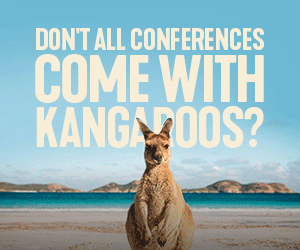Avoid, Intercept, Redesign

Did you know that every piece of plastic with which you have ever had contact is still on our planet? Take a moment, and really absorb that fact – every piece of plastic that you have ever used: food packaging, childhood toys, stationery, water bottles.…so many water bottles!! Those items are still here in one form or another, most probably as tiny microplastics in our oceans.
Working in the events industry, the fact above resonated with me even more so, as I looked back over the years to think about the needless waste that clogs up our landfills after an event – the once-used carpets, signage, event décor, plastic name badges and, again, the vision of a mountain of plastic water bottles.
.jpg) We are now in a situation where awareness has been raised by high profile documentaries, news stories and alarming statistics about climate change. However, awareness is one thing, taking action is another and more importantly, taking the correct action. The long-term impact of a conference with its throwaway mentality is being challenged by all stakeholders, PCOs, Associations, venues alike, so where do we start in order to make meaningful change?
We are now in a situation where awareness has been raised by high profile documentaries, news stories and alarming statistics about climate change. However, awareness is one thing, taking action is another and more importantly, taking the correct action. The long-term impact of a conference with its throwaway mentality is being challenged by all stakeholders, PCOs, Associations, venues alike, so where do we start in order to make meaningful change?
We all know the feeling, the conference is over, the team is delighted with the outcome and everyone goes home for a well-deserved rest and then starts work on the next event. But this is the perfect time to work together with the venue, event suppliers and team, to visit the rubbish area and take stock of what is being thrown away. Do an audit – what items could have been re-used, re-purposed, re-designed in the future so that there is less waste? Work on the following principles: Avoid, Intercept and Redesign.
With this data in hand, you will be able to collaborate with all the relevant stakeholders, to implement change for future events. The term collaborate is key here, we are all working for a common goal and by coming up with solutions together rather than in isolation not only avoids re-inventing the wheel but also builds relationships. Why not have a debrief with not only the venue but with the CVB, hotels, suppliers – anyone that was involved in the event? What better positive publicity for a destination or event than a powerful story around sustainability, collaboration and innovative thinking.
As meeting professionals, regardless of the sector in which we work, we need to ensure that sustainable options are readily available for our events, as the demand increases. These options need to be clear, affordable and easy to manage. We are all working to tighter lead times and that is the real danger in terms of making good sustainable decisions vs. getting on and delivering the event in a week’s time. This really shows the importance of engaging all local stakeholders to be on board from the outset.
It is also important to remember that sustainability is a very personal trend. One that spans all demographics and, as we all feel we could be making more of a difference for the future of the planet, this passion should be used within your team members to ignite innovative thinking.
With all this in mind, my final thoughts are that with any trend or challenge there comes a knee-jerk reaction. How can we adapt and be creative, how much will it cost the organisation, how can we be the first to react? What follows is usually thousands of organisations going off, doing their own research, and making sure that they have responded accordingly – another check on the long list of things to do.
Quite often with these sorts of responses, creative thinking can only go to one level. For example, creating branded re-usable cups for a conference – whilst on paper sounds brilliant and takes away from the plastic bottles, where do these re-usable cups go? Into the delegates’ cupboard with the other branded re-usable cups for a couple of years only to be eventually thrown out. Quite often these cups are made of a much hardier material making them less likely to be able to be recycled in any form. There is a need to follow the product journey to the end – what can seem innovative initially could actually make matters worse.
The issue of sustainability affects us all, at a personal and professional level, and should not be something that is competitive. The sooner the meetings industry stop, collaborate, and listen to each other the better, so we can do what we do best: deliver high-quality events that have a lasting legacy with our communities, events that will not be detrimental to the planet.
IAPCO has created its 50th Anniversary Legacy Campaign – Not Just a Drop in the Ocean with a clear mission to rid the meetings industry of single-use plastic. Join us by taking the pledge to make a real measurable change. Find out more and download the toolkit with lots of useful information, resources and of course the pledge iapco.org/about-iapco/ticky-the-turtle/
About the author
This article was provided by the International Association of Professional Congress Organisers, author Olivia Galun, Marketing and Member Services Manager, IAPCO. IAPCO represents today 133 companies comprised of over 8300 professional congress organisers, meeting planners and managers of international and national congresses, conventions and special events from 40 countries www.iapco.org
Other Articles
About Us
Supported by the Union of International Associations (UIA), the International Association of Professional Congress Organisers (IAPCO) and the Interel Group, the global public affairs and association management consultancy, Headquarters Magazines serve the needs of international associations organising worldwide congresses.















